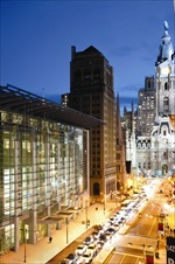Teamsters, Carpenters Opt Out of Signing on for New Work Rules at Pennsylvania Convention Center

It’s been a roller coaster ride over at the Pennsylvania Convention Center in Philadelphia and, with the local Carpenters’ union striking twice in the past year - most recently in the middle of a show last week - venue officials drew a line in the sand and issued an ultimatum to all six unions working in the center.
A deadline of a minute before midnight May 5 was set for the unions to sign a new “Customer Service Agreement” that would allow exhibitors to do more of their own work at the Pennsylvania CC, and two of those unions, Carpenters Local 8 and Teamsters Local 107, opted out.
“The board of the Pennsylvania Convention Center Authority (which oversees the center) unanimously ratified a new Customer Service Agreement that was signed by four of the trade (unions),” said Bob McClintock, COO of facilities manager SMG. “(This) agreement gives the center the chance to move forward and compete on a national scale.”
The four unions who signed the new CSA - Laborers’ International Local 332; Stagehands Local 8; IBEW Local 98; and Iron Workers Local 405 – have been asked by center officials to fill in where needed.
In an open letter issued to its stakeholders before the deadline was set by the PCCA and SMG, officials said, "Customers have indicated to the PCCA, SMG, and our partners at the Philadelphia Convention and Visitors Bureau (PHLCVB) that the status quo related to the Customer Satisfaction Agreement and work rules at the building is unacceptable and places us at a competitive disadvantage to peer facilities in other cities.”
The letter added that “modernizing work rules is necessary so the center can compete effectively with convention facilities in other cities and meet the needs of our customers.”
The officials said that last week’s strike by the Carpenters during the American Academy of Neurology Annual Meeting caused “loss of significant business to the center.”
They added that the decision to strike “irrevocably changed the dynamics of what is an acceptable Customer Satisfaction Agreement. The damage caused by this union's decision to strike is immediate, far reaching and quantifiable by comparison with lost business directly resulting from the previous strike this past summer.”
The letter continued by pointing out that the costs now at the center puts it at a significant competitive disadvantage to cities such as Chicago and New York City.
The new CSA addresses a range of concerns raised by both customers and trade unions that operate in the building, according to venue officials. These provisions include:
• Expanded exhibitor rights, including the ability to use power tools and ladders when setting up their exhibit booths and the ability to perform work in their own booths in size up to 600 square feet;
• Enabling Center management to call upon a core workforce of trade union members to meet its labor needs, ensuring these individuals have a greater understanding of Center operations and policies, as well as the needs of customers;
• Greater jurisdictional stability for the unions that operate in the building, increased consistency of work hours for trade unions members, and the establishment of a safety committee;
• Providing contractors with an increased ability to manage work performed in the building; and
• Creates economic stability for all parties to the agreement as well as for customers and their contractors.
“Today’s action demonstrates the Board’s commitment to make the Center a world-class facility that is responsive to customer feedback and is willing to do what is necessary to be compete with our peer facilities on a national scale,” said Gregory J. Fox, chairman of the Pennsylvania Convention Center’s Board of Directors.
He added, “The leadership of the Pennsylvania Convention Center has an obligation to the residents and taxpayers of the Commonwealth and to our customers to ensure we have in place the best policies that maximize our ability to attract and retain business and fulfill the Center’s promise as the leading economic driver of the region’s hospitality industry.”
Calls for comment to the Carpenters’ and Teamsters' unions were not returned.


Add new comment